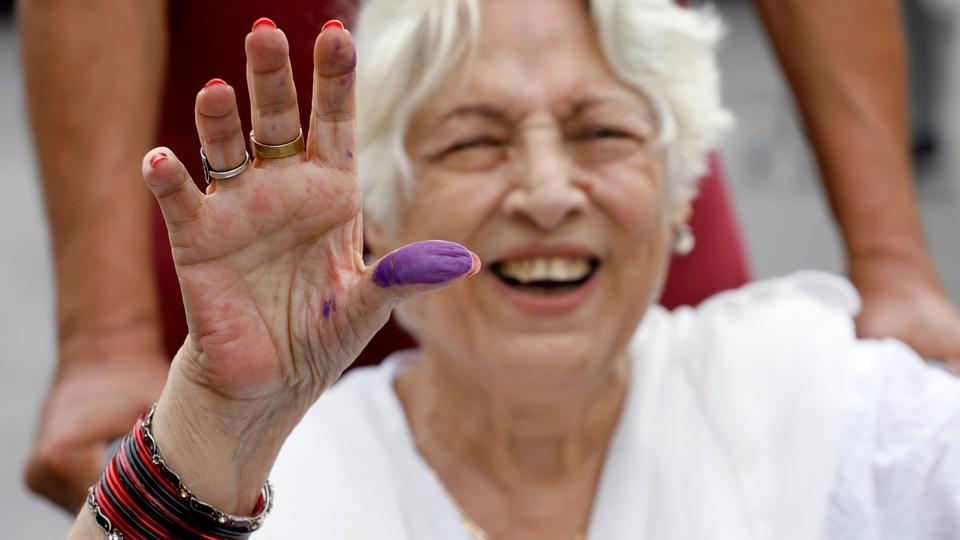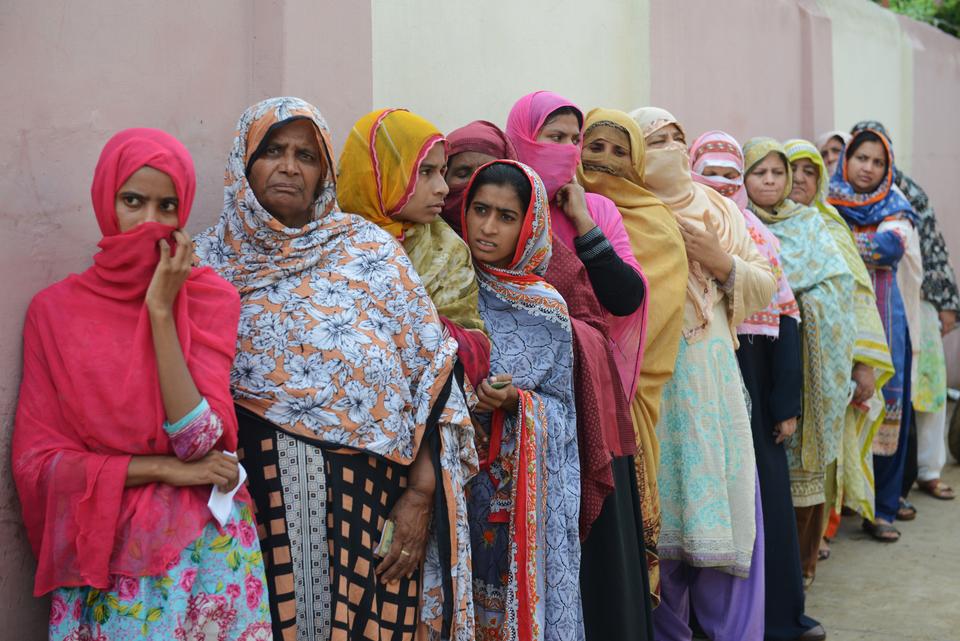Pakistani women make history as some vote for the first time
Women who had been previously barred from voting in several regions, including Dir, Kohistan, North and South Waziristan, made a beeline to the polling stations on Wednesday, making the day of elections a historic one.
 A voter displays her inked thumb after casting her vote during the general elections in Karachi, Pakistan. July 25, 2018. (Reuters)
A voter displays her inked thumb after casting her vote during the general elections in Karachi, Pakistan. July 25, 2018. (Reuters)
Pakistani women made history on Wednesday with an unprecedented turnout in an election that will see the second civilian transfer of power after decades of military rule.
Female voters constitute 44.1 percent of the total eligible voters across the country. In previous elections, even those who were registered were not allowed to vote by men.
“In previous elections, women have been deliberately pushed to the margins and were not allowed voting rights. This has been slowly and gradually countered by the Election Commission of Pakistan [ECP] by different mechanisms,” Abid Hussain of BBC Urdu told TRT World on Wednesday.
“This year they made it mandatory that every political party has to give tickets to at least 5 pc of women. They also said that no results will be accepted if they don’t have 10 percent women polling in those constituencies,” Hussain said.
Breaking the glass polling box
Babar Yaqoob, the ECP Secretary, confirmed that in the region of Dir in the northwest province of Khyber Pakhtunkhwa, women came out to vote for the first time in the country’s history, local media reported. Dir has historically made pre-poll agreements to not let women vote.
Women cast their votes for the first time at many polling stations in Kohistan, in the same province.
The Federally Administered Tribal Areas (FATA) also made strides. Kurram tribal district’s independent candidate Ali Begum, the only female from FATA to run, observed women’s presence at the polls.
Female turnout in #NA46, #Kurram is really encouraging. Today they will make a history by electing their own female candidate. #VoteForAliBegum
— Ms. Ali Begum Khan (@Mrs_AliBegum) July 25, 2018
While the women of Mohmand tribal district in FATA had voted before, there was a notable increase in turnout.
“Women came out in large numbers in Mohmand Agency, according to official data,” Iftikhar Firdous, bureau chief for The Express Tribune told TRT World. “While previous results showed only 13 percent voted in earlier elections, it is believed this has tripled.”
“In distant areas like Bayzai subdivision on the Pak-Afghan border, it was a first vote for many women,” Firdous said.
The last polling station for women in Mohmand tribal district’s Bayzai is just five km from the border with Afghanistan.
This is the last polling station for women on the Pakistan side of the Durand Line on the Pak-Afghan border. Women are stiml coming into vote. The Deputy Commisioner @wasifsaeed85 says women polling is expected to jump to 50% in the tribal district. pic.twitter.com/pMl1DB4rxK
— Iftikhar Firdous (@IftikharFirdous) July 25, 2018
As polling ends a massive shout out to 651 female polling staff ; mostly teachers & LHWs as lady searchers . The 96,679 female registered voters got a chance to come at the 52 female polling stations to cast their votes in Mohmand District because of them.#PakistanElections2018 pic.twitter.com/SMTuwNlE7k
— Wasif Saeed (@wasifsaeed85) July 25, 2018
Around 105.96 million voters across Pakistan registered for the July 25 elections. Women comprise 46.73 million, about 44.1 percent of the electorate.
The registration of female voters for the July 25 elections has increased by 24 percent when compared to the 2013 elections. In the last general elections, over 95 percent of registered women did not vote in at least 17 National Assembly constituencies.
Pakistani women have had the right to vote since 1956, but in many war-torn and rural areas, they are still not allowed to exercise universal suffrage.
“We made history today. It is the first time that women have come out of their homes to cast their vote,” FATA’s North Waziristan Administrator Mohammad Ayaz Khan told AP on Wednesday.
For the first time in North Waziristan women are coming out to vote, “ Ayaz Khan, DC Tribal District NWA, tells Geo’s Rasool Dawar. (Image by Rasool Dawar) pic.twitter.com/59G6nSxaUD
— Benazir Shah (@Benazir_Shah) July 25, 2018
Where women are still barred
Despite a fair turnout of women, several irregularities were reported in some regions.
Around 15 complaints were received in Khyber Pakhtunkhwa regarding women not being allowed to vote, Dawn reported.
The complaints were shared with the provincial government and administration for further action, it said.
“There’s a village of Dharnal near Chakwal, where men tried to stop and sent back vehicles full of women. Our reporter was on the spot and could see very few women who were able to cast their votes,” Hussain said. “Men, when asked, in fact said very proudly that they won’t let their women vote because it is ‘non-islamic’,” he added.
“Besides that there was a rural constituency in Peshawar where one of the polling stations, with 987 female registered voters, had no female voter for [the] first four-and-a-half hours of voting,” he said.
Male elders in 1947 banned females from voting in Mohri Pur, some 60 km (35 miles) from the city of Multan in Punjab, and the women have obeyed ever since.
This year many had vowed to cast a ballot following changes to Pakistan’s election laws.
Some 3,200 women were listed on the electoral register in Mohri Pur but not one voted, according to election officials and an AFP journalist at the village’s sole polling station.
“We have threats from our husbands that they will divorce us if we cast our vote,” 25-year-old Tanya Bibi said as she walked past the polling station, without going in.
Around 8,000 men were registered to vote in the village. Large queues of them formed at the polling station located in a school.
“We are here to cast our ballots, but our women didn’t cast their votes, because it is our old tradition which we have been preserving,” Muhammad Shamsher said.
Even Qasir Abbas, a lawyer who campaigned for the women’s vote, said in the end he did not bring his wife to the polling station, explaining, “I was afraid … the villagers might boycott my family.”
 Pakistani women stand in a queue as they wait to cast their vote outside a polling station during general elections in Lahore on July 25, 2018. (AFP)
Pakistani women stand in a queue as they wait to cast their vote outside a polling station during general elections in Lahore on July 25, 2018. (AFP)
The ECP announced before the general elections that any polling station across the country with a turnout of less than 10 percent female voters would have its results cancelled.
The requirement is part of an election law presented in 2017 that aims to encourage more women to vote.
“Tradition plays a major role in suppressing the women’s right to vote and men often use it as a cudgel to continue the oppressive patriarchal approach towards half of the country’s population,” BBC Urdu’s Hussain said.










